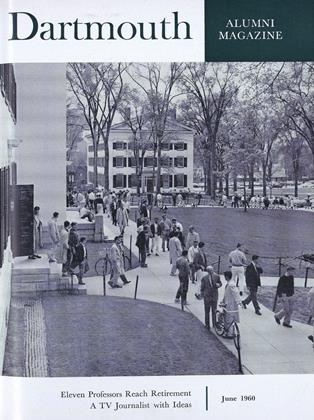DARTMOUTH College's debaters last month emerged from the National Intercollegiate Debate Tournament at West Point as national champions, but a concurrent victory was almost as sweet. In winning the nationals they overcame what they had come to consider a jinx.
The winning team of Anthony Roisman '60 of Oklahoma City and Saul Baernstein '60 of Houston explained that Dartmouth debaters had qualified to represent the Northeastern District in each of the past seven years. They had never finished better than fifth or worse than ninth in the 36-team field in the finals. Previous teams had been optimistic about their chances on the basis of their records, but had never quite reached the top rung.
Dartmouth's 1960 chances looked good too. Roisman and another senior had won several major tournaments. They were experienced and knew the topic well. However, a month before the nationals Roisman's teammate had to withdraw from school. It appeared their luck had run out again.
"At this point," according to Baern-stein who was nominated to take the departing member's place, "only the freshmen in the Forensic Union were still confident ... and they didn't know any better."
But Herbert L. James, assistant professor of speech and coach of the Forensic Union, said, "Saul came through beautifully for us, as I felt he would. He was chosen the fourth best debater at the tournament." Roisman was third.
The road to West Point had started for Roisman in Oklahoma City's Northwest High School. He had debated in the Oklahoma State Tournament and the Forensic Union became his principal extracurricular activity at Dartmouth. Baernstein had participated in the National High School Tournament in 1955 and won the Texas Extemporaneous Speaking Contest.
The debaters averaged ten hours' work a day for the three weeks before the nationals, doing research and sharpening their techniques. Since September they averaged about twenty hours a week on preparations, but it apparently hasn't detracted much from their class work. Both have better than "B" averages.
Since September Forensic Union members have traveled more than 30,000 miles and won fourteen of thirty tournaments they entered throughout the country. They stretch their travel allowances to the utmost by piling several persons into a car, eating in cafeterias and inexpensive restaurants, and sleeping in college dormitories or fraternities, at friends' homes or YMCA's while on the road.
They feel that the effort they make as a team is backed by the entire Forensic Union. Undergraduate members make copious notes which are exchanged and studied.
Even alumni help. Ronald Snow '58 called the Forensic Union one night from New Haven where he is attending Yale Law School. He had uncovered a couple of legal precedents that bore on the national topic and passed on the information. Martin Budd, a senior who spent last summer and fall in Washington doing independent work in public affairs on a special fellowship, also discovered some pertinent data and told the debaters about it.
The debaters will argue about almost anything, but they are unanimous in at least one opinion: Much of the credit for the team's success must go to Coach James. He spends much of his time - evenings and weekends included — in coaching the debaters, traveling with them, and making the thousand and one arrangements for participating in tournaments.
As for Coach James, he feels that working with the students is rewarding and a championship makes it even more so.
"Even that 38-hour drive through a blinding snowstorm en route from a debate with Northwestern University back to Hanover for Monday classes becomes a pleasant experience in retrospect," he said.
Saul W. Baernstein '60 (1) and Anthony Z. Roisman '60 (r), winners of the national intercollegiate debating championship for Dartmouth, pose with the Harmon Trophy and their coach, Professor Herbert L. James.
 View Full Issue
View Full Issue













